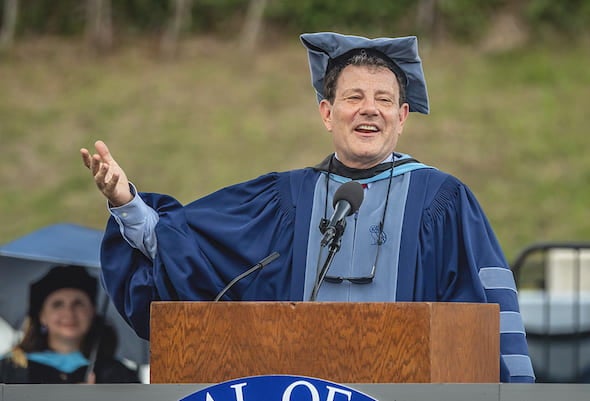Empathy is needed more than ever, said Nicholas Kristof, who encouraged two years of Rice University graduates to use their skill and kindness to make a difference, even if their actions only seem to be a “drop in the bucket.”
The New York Times columnist addressed an early morning audience at Rice Stadium on May 15, fulfilling his commitment to speak to the Class of 2020 and — because of the pandemic — including the Class of 2021 as well during this year’s unusual triple ceremony, which incorporated the 107th and 108th commencements.
Rice awarded 2,206 degrees in total to the Class of 2021, to 1,082 undergraduate and professional degree students (some of whom earned multiple degrees) on Friday night and 1,126 to graduate students Saturday morning. Many of the Class of 2020 who received their degrees in an unconventional virtual ceremony last year returned to campus for the Saturday morning and evening events.
Though Kristof addressed advanced and doctoral students on Saturday morning, the relaxation of masking requirements two days before prompted President David Leebron to invite the entire Rice community to hear him in person.
He introduced Kristof, an “Oregon farm boy turned New York Times columnist,” as a man of curiosity, compassion and courage who has led a life of adventure as well as purpose. “He has been described as the Indiana Jones of our generation of journalists,” Leebron said.
He noted Kristof follows his wife Sheryl WuDunn, a former Times reporter and fellow Pulitzer Prize winner, as a Rice commencement speaker.
“She will note,” Kristof quipped, acknowledging pandemic-forced changes to the ceremony, “that she had a rather larger in-person attendance at her commencement.”
He proceeded to echo the theme of her 2016 speech, but with his own experience as a guide.
“We need to pair education and humility,” Kristof said. “Humility, in turn, nurtures empathy, because it emphasizes our shared humanity with those less fortunate, and that empathy in turn helps answer crucial questions. Why did I go to a great university? What purpose does my education have? What purpose do I have?”
Kristof recalled meeting Rice students in Malawi and seeing their continuous positive airway pressure (CPAP) device “made of a water bottle and two aquarium pumps.” That device, developed into the Pumani CPAP, has since helped nearly 1 million babies breathe.
“The Rice students were undergraduates in the bioengineering program and they designed a simple CPAP machine that costs less than $400. … Those Owls leveraged their Rice education to develop a project that now is saving lives in less developed countries,” he said. “They did so in a triumph of education and engineering and also a triumph of empathy, because they recognized that all lives have equal value.”
Kristof gave examples of both the toll a lack of empathy can take, and the grace its presence confers.
He recounted the tale of the Knapp family, neighbors in his hometown of Yamhill, Ore. A Times feature he wrote with WuDunn early last year described the toll of social disintegration on the working class that ultimately took the lives of four of the family’s five children.
Since then, he told the Rice graduates, the fifth has died of an overdose after losing his job at the beginning of the pandemic. “Five smart, talented kids with so much to offer, who at one time exemplified upward mobility.”
He noted a third of the children who rode his school bus have died from drugs, alcohol and suicide, “what are known as deaths of despair.”
“So what killed them? We have a narrative in this country about personal responsibility that points the finger at people for making bad choices,” Kristof said. “And let's be honest, there is something to that. … But I think that narrative is also inadequate. Part of the problem has been policies embraced by high-education America, essentially our community, and reflecting, I think, a certain callousness toward the pain in low-education America.”
He acknowledged that environmentalists “like myself” halted logging of old-growth forests, in the name of saving an endangered species, the spotted owl. “That was the right decision to make,” he said. “But in retrospect, I wish that we had shown as much empathy for my old schoolmates. … So I challenge your generation to bridge not only our education gaps, but also our empathy gaps.”
One peril of education, he said, is that “it leads people to become, to use a technical term, full of themselves.”
“If only everybody else were like you,” he said. “And you know, there is something to that. … You are hard-working, you are smart. But another reason that you probably succeeded, in all humility, is that you probably won the lottery of birth. … Well, if we can bridge that empathy gap, the returns can be truly enormous.”
He told two stories about the significance of seemingly small acts of empathy, “drops in a bucket.”
The first told of the extraordinary actions of a teacher whose above-and-beyond actions redirected the downhill path of a child, Olly Neal, to a distinguished career as a lawyer and judge. (You can read his column about Neal here.)
The second told of the empathy by a church in Portland, Oregon, that sponsored an Eastern European’s immigration to America in 1952. That tale of his father’s rich life is an example closest to Kristof’s heart.
“That’s how you fill buckets,” he said.
View Kristof’s speech and all ceremonies at commencement.rice.edu/all-feeds.



